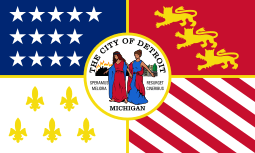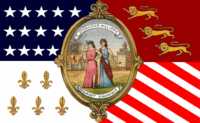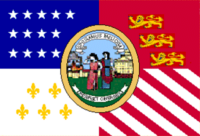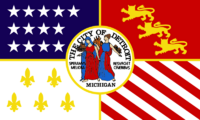Flag of Detroit facts for kids
 |
|
| Use | Civil flag |
|---|---|
| Proportion | 3:5 |
| Adopted | 1948 (last modified in 2000) |
| Design | City seal emblazoned on quartered background. |
| Designed by | David E. Heinemann |
The flag of Detroit is a special symbol for the city. It was created in 1907 by David E. Heineman and officially became Detroit's flag in 1948. Over the years, its look has been changed a few times, with the most recent update happening in 2000.
What the Flag Looks Like
The Detroit flag has a special seal in the middle. This seal is placed on a background that is divided into four sections, like a cross. Each section represents a different country that once had control over the city of Detroit.
- The bottom left part of the flag shows five gold fleurs-de-lis (a fancy lily symbol) on a white background. This represents France, which founded Detroit in 1701. It looks like the old Royal Standard of France.
- The top right part has three gold lions on a red background. This stands for Great Britain, which controlled Detroit from 1760 to 1796. It looks like the Royal Arms of England.
- The bottom right section has 13 red and white stripes.
- The top left section has 13 white stars on a blue background. Both of these parts represent the original Thirteen Colonies of the United States.
Meaning Behind the Flag
The flag features two Latin sayings that tell an important story about Detroit.
- The first saying is Speramus Meliora, which means "We hope for better things."
- The second saying is Resurget Cineribus, meaning "It will rise from the ashes."
These mottos were written by Gabriel Richard after a huge fire in 1805. This event, known as the Great Fire of 1805, burned almost the entire city of Detroit to the ground, leaving only one building standing. The seal on the flag shows this moment. On the left, there's a figure crying over the destruction. On the right, another figure points to the new city that will grow from the ashes of the old one.
Flag's History
When the Detroit flag was first designed, the city's seal in the middle was shaped like an oval. In the early 1970s, the flag was updated, and the seal was changed to a circle. A few years later, in 1976, the colors used on the flag were made standard using a system called Pantone Matching System. Around the year 2000, the seal was changed again to use fewer colors, making it simpler.
See also




